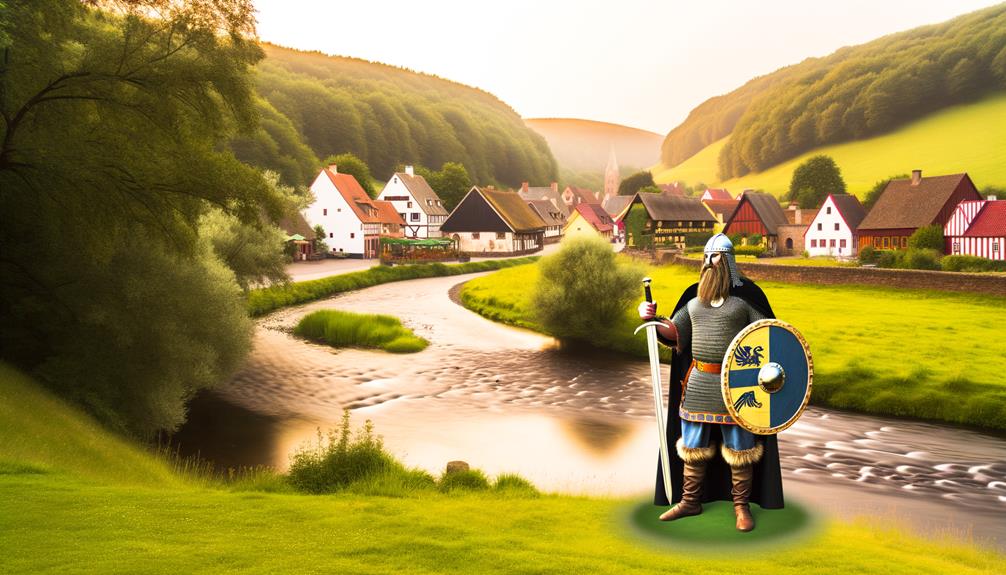The Meaning of the Name Norman
The name 'Norman' originates from the Old Norse term 'Normanni,' which referred to Scandinavian settlers and explorers. Over time, this term was Latinized and eventually evolved into 'Norman' in English.
Historically, the Normans established significant territories, including the Duchy of Normandy and played prominent roles in medieval history through events like the Norman Conquest of England in 1066. Cultural and architectural advancements were among their notable contributions.
Today, the name Norman symbolizes a connection to tradition and historical significance, maintaining relevance across various contexts. To gain deeper insights into its historical and cultural impact, explore further.

Key Takeaways
- The name 'Norman' originates from the Old Norse term 'Normanni,' meaning Scandinavian settlers or explorers.
- 'Normanni' was Latinized during interactions with the Roman Empire and evolved into 'Norman' in English.
- The name reflects the historical migration and settlement patterns of Norse people in medieval Europe.
- 'Norman' symbolizes reliability and tradition and is used in various cultural and geographical contexts.
- The name carries historical significance, connecting medieval influences with contemporary usage as a given name or surname.
Origins and Etymology
The name 'Norman' originates from the Old Norse term 'Normanni,' which translates to 'Northmen' and was used to describe Scandinavian settlers and explorers. This etymological root reflects the geographical and cultural origins of these people from northern Europe, specifically regions now known as Norway, Denmark, and Sweden.
The term was later Latinized as 'Normanni' during interactions with the Roman Empire and medieval Latin-speaking scholars. Over time, 'Normanni' evolved into 'Norman' in the English language. The transformation of this name is indicative of how languages adapt and integrate foreign elements.
Understanding this etymology provides insight into the historical migration patterns and linguistic influences that shaped medieval Europe, emphasizing the interconnectedness of language and history.
The Normans in History
Having established their roots in Scandinavia, the Normans played a pivotal role in shaping medieval European history through their conquests, cultural exchanges, and political influence.
Their migration to Northern France led to the establishment of the Duchy of Normandy in 911 AD, a strategic base from which they launched further expansions. The Norman Conquest of England in 1066, led by William the Conqueror, altered the social and political landscape, introducing feudalism and reshaping governance.
Normans also ventured into Southern Italy and Sicily, establishing influential kingdoms that facilitated cultural syncretism between Latin, Byzantine, and Islamic traditions. Therefore, the Normans were instrumental in fostering cross-cultural interactions and influencing the trajectory of European development during the Middle Ages.
Famous Normans
Many notable figures emerged from the Norman lineage, each contributing greatly to various facets of medieval history and culture. Key historical personalities included William the Conqueror, known for the Norman Conquest of England in 1066, and Roger II of Sicily, who established a powerful kingdom in the Mediterranean. Additionally, Robert Guiscard played an important role in Norman expansion in Southern Italy. Their achievements underscore the Normans' influence in shaping European history.
| Name | Achievement | Region |
|---|---|---|
| William the Conqueror | Norman Conquest of England | England |
| Roger II of Sicily | Establishing Kingdom of Sicily | Mediterranean |
| Robert Guiscard | Expansion in Southern Italy | Southern Italy |
| Henry I | Consolidation of Norman Rule | England |
Their legacies remain significant in understanding the medieval era.
Cultural Impact
Although often remembered for their military conquests, the Normans also left an indelible mark on the cultural landscape of medieval Europe. Their architectural innovations, particularly the Romanesque style, profoundly influenced church and castle designs, leading to iconic structures like the Tower of London.
Norman governance introduced feudalism, altering societal hierarchies and land ownership patterns. In literature, the Normans enriched the lexicon, integrating Old French with Anglo-Saxon, shaping the evolution of the English language. Moreover, their legal reforms laid the groundwork for common law systems.
Through these contributions, the Normans not only expanded their territories but also fostered cultural and structural advancements that resonated through subsequent centuries, underscoring their multifaceted impact on European history.
Modern Usage
In contemporary contexts, the name Norman frequently appears in various cultural, geographical, and personal domains, reflecting its enduring legacy and versatility. Despite its historical roots, the name has adapted well to modern times.
In literature and film, characters named Norman often symbolize reliability or tradition. Geographically, the term continues to be associated with regions such as Normandy, influencing place names and cultural references.
On a personal level, the name remains in use, albeit less commonly, signifying a preference for classic nomenclature. The versatility of Norman as a given name or surname demonstrates its ability to bridge historical significance with contemporary relevance, making it a notable example of enduring linguistic heritage. Furthermore, the history of Stetson name adds to the enduring linguistic heritage, as it has been passed down through generations and carries with it a sense of tradition and heritage. This sense of continuity and connection to the past contributes to the continued use and reverence for names like Norman and Stetson, demonstrating the significance of linguistic heritage in shaping personal and cultural identity.
Conclusion
To wrap up, the name Norman, with roots tracing back to the Norsemen and the Norman invaders, stands as a beacon of historical significance. Its bearers have left indelible marks on history, shaping cultures and societies.
Over time, the name has evolved, yet it remains a tribute to resilience and influence. In modern contexts, Norman continues to echo its storied past, intertwining the threads of history with the fabric of contemporary identity.






